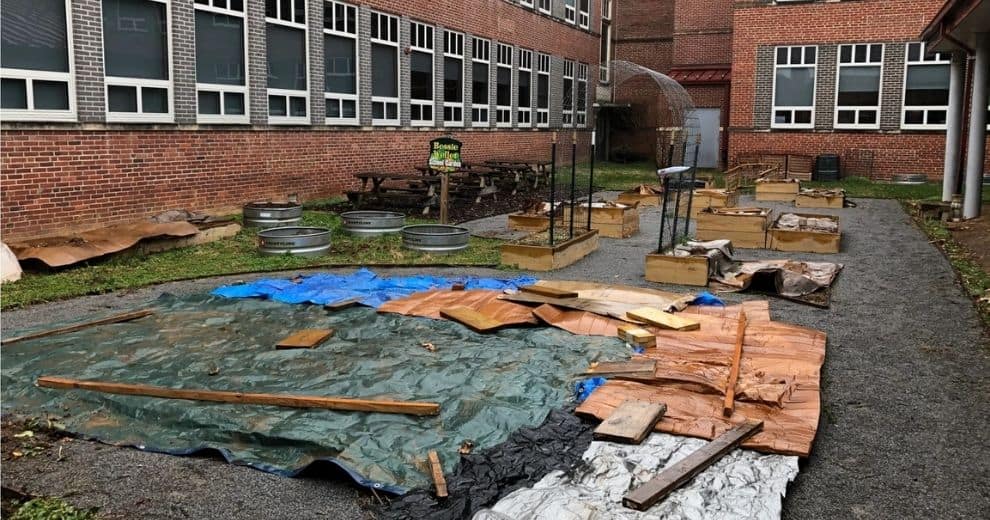Contributing reporter: Jamie Saunders ’23
Flash back to 2018 in the courtyard of Bessie Weller Elementary School in Staunton. A team of MBU students, College of Education faculty, and Bessie Weller students and parents were hard at work building 20 raised garden beds and filling them with new soil.
It was the beginning of a new resource for local elementary schoolers where they could experience hands-on how to grow, harvest, and prepare fresh fruits and vegetables.
Originally funded through a grant in the MBU Environment-Based Learning Program — part of which has now transitioned to a new online program called Authentic Learning and Leadership — the school garden was completed last year. Though the pandemic created roadblocks to fully engaging Bessie Weller students during the garden’s first official year, a new spring is right around the corner.
“I’m proud of this story, because it demonstrates how it takes a village to make good things happen,” said Tamra Willis, professor of education at MBU, who helped get the project off the ground and through several phases of development.
The school garden is truly a collaborative effort by the Staunton community, involving the administration of Bessie Weller and Staunton City Schools; Staunton-area teachers, students, parents; students and faculty from MBU’s College of Education; Project GROWS; the Allegheny Mountain Institute, and local businesses through providing consulting, discounts, and donations.

When starting a large educational garden, quite a lot of supplies are needed. On the checklist for Bessie Weller were walkways, plant containers, raised beds, soil and mulch, trellises, compost bins, rain barrels, hoses, gardening tools, plants, and weather stations. Then add in learning tools like digital cameras, microscopes, iPads, field guides, library books, and teacher guides.
Willis helped secure funding for all the start-up costs through a grant from the National Oceanic and Atmospheric Administration’s Chesapeake Bay initiative.
In addition, the grant covered MBU environment-based learning course tuition and professional development workshops that MBU offered at Bessie Weller, so interested teachers would be set up for success.
“The biggest obstacles for me getting the project started were keeping up with progress reports and finances, along with the typical garden issues such as weather and weeds,” Willis said.

MBU students (left) and Assistant Professor of Education Angela Wilson (right) volunteer at the garden site. (Photo taken before the COVID-19 pandemic.)
After MBU and Bessie Weller volunteers chipped in to get the garden space established, Willis helped Staunton City Schools apply for an Allegheny Mountain Institute (AMI) fellow to oversee planting and caring for the garden as well as create educational activities and curriculum connections. England Avis served as Bessie Weller’s first garden-based outdoor learning coordinator for her AMI fellowship last year.
When the pandemic struck, Avis was unable to work in person with Bessie Weller teachers and students since they completed the 2019–20 school year and started 2020-21 through virtual learning. She creatively adapted to the challenges and brought the garden to life, as chronicled in her blog.

The completed garden features an interactive Three Sisters garden and sunflower room. Photo credit: England Avis
“In this year of challenges, it’s great to see the seeds we planted growing in the community,” said Willis.
In future years, Bessie Weller students will really get their hands dirty in the garden, growing seeds, observing insects, composting, watering, weeding, and harvesting. They’ll learn about nutritious food and get to enjoy fresh produce in classroom taste tests and cafeteria meals.
And their understanding of how an ecosystem works and why it’s important to preserve the environment will grow right alongside their vegetables.
“In this year of challenges, it’s great to see the seeds we planted growing in the community. ”
Tamra Willis, professor of education